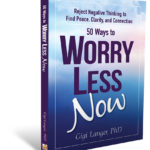
For example:
- My daughter should stop using drugs.
- This person, (fill in the blank), must be nicer to me.
- The mayor (or president, legislator, etc.) is wrong and ought to (fill in the blank).
- I should be healthy and happy and never experience troubling situations.
Unenforceable Rules
According to Fred Luskin, director of the Stanford University Forgiveness Project, these “shoulds” are examples of unenforceable rules: They demand an outcome you believe must come true, but over which you have no control. Such inflexible beliefs make us helpless, angry, hurt, hopeless or bitter.
Although holding an unenforceable rule may feel good–even noble–it doesn’t mean you can make it happen. In the first example, the daughter should stop using drugs, but no matter how persuasive the mother’s arguments, she doesn’t have the power to make her daughter stop.
The mother does, however, have control over her own choices and behavior. She can seek help from a therapist or Al-Anon, and claim a positive power to work in the situation. Then she might choose a goal for how she wants to act and feel, detach from the result, and use growth tools for her own peace of mind, regardless of her daughter’s choices.
Overcoming My Own “Shoulds”
One of my own unenforceable rules became clear as I was writing this book. When my mother passed away, I found it difficult to write and became discouraged by my lack of progress.
When I honestly faced the belief that I must complete the book by a certain date, I became willing to see it differently. After using Tool 6, Is It True? I turned my whispered lie around to “I will finish writing the book at the perfect time.” In turn, I became more flexible and kinder with myself.
The essence of happiness is peacefully allowing life to unfold. Nothing becomes a live-or-die situation because you know your loving power is working things out, with results that may far surpass your greatest hopes.
(Excerpt taken from page 56-57 of Gigi Langer’s award-winning book, 50 Ways to Worry Less Now)

Gigi Langer holds a PhD in Psychological Studies in Education from Stanford University. She is a seasoned author and popular speaker who has helped thousands of people improve their lives at home and work. Gigi hasn’t had a drug or drink for over 30 years, although she does occasionally overindulge in Ghirardelli chocolate and historical novels.

Her book, 50 Ways to Worry Less Now (available HERE in paperback, e-book, & audiobook) has gained rave reviews (4.8 on Amazon) and a publishing award.
 What would 2019 be like if we let go of all complaints and resentments? If we could admit that perhaps we’re not always right, and released the wounds and conflicts of the past? What if, when we thought of a person we didn’t like, we refused to gossip, criticize, or hate?
What would 2019 be like if we let go of all complaints and resentments? If we could admit that perhaps we’re not always right, and released the wounds and conflicts of the past? What if, when we thought of a person we didn’t like, we refused to gossip, criticize, or hate? Peace, Clarity, and Connection. 5-stars on Amazon. Use “20lessnow” code
Peace, Clarity, and Connection. 5-stars on Amazon. Use “20lessnow” code 